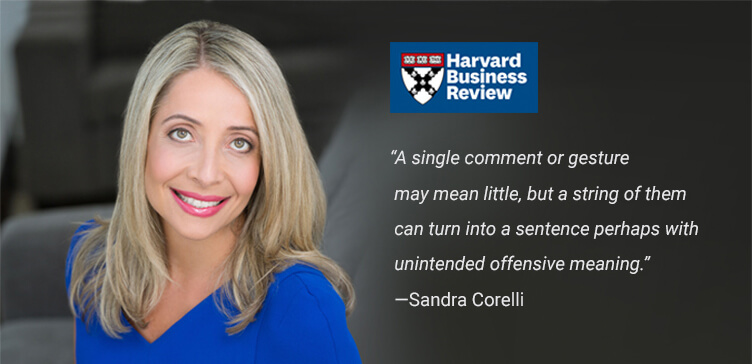It’s Not Always Clear What Constitutes Sexual Harassment.
Acclaimed author, leadership expert and educator Kathleen Kelley Reardon contacted Sandra Corelli, Vice President at CCI, to discuss one of the most complex workplace issues today – sexual harassment.
She was compiling research for her forthcoming HBR article. Entitled, It’s Not Always Clear What Constitutes Sexual Harassment. Use This Tool to Navigate the Gray Areas., the article was published June 18, 2018.
Dr. Reardon requested Sandra’s feedback on her workplace tool, the Spectrum of Sexual Misconduct at Work (SSMW). She developed the spectrum to help people define and differentiate among types of gender-based offences. Created as a blueprint for organizations, the spectrum tool assesses damages that could derail work relationships.
It helps people determine when and how to respond. As a workplace tool, SSMW opens the door to conversations about what exactly constitutes sexual harassment by categorizing remarks, actions, and behaviors within the scope of numerous offences.
Gray area
Despite all the energy and press surrounding the #MeToo movement, discussing harassment at work still remains a gray area where retaliation is sometimes feared. Sandra explains; “Not all women feel they can come forward and the reasons vary. For example, ‘In this small company is anyone going to listen, or believe me?’ ‘Will I lose my job?’ Or sometimes there’s shame, ‘Did I bring this on myself?’ – is a frequent deterrent.”
Sometimes, men’s inadvertent remarks meant as a compliment carry the power to make women feel uncomfortable.
“A single comment or gesture may mean little, but a string of them can turn into a sentence perhaps with unintended offensive meaning.”
—Sandra Corelli, It’s Not Always Clear What Constitutes Sexual Harassment, HBR, June 18, 2018.
The consequences of ignoring sexual harassment are serious, cautions Diane Craig, President and Founder of Corporate Class Inc. “Leaders need to think internally. When people perceive their organization has turned a blind eye to an offence, this may not align with what they believed the company’s values were –and that has the potential to create a decline in morale, loyalty or even productivity.”
Sandra acknowledges that every conversation about sexual misconduct, even when it’s accidental, is a difficult one that requires courage. She praises Dr. Reardon’s spectrum tool; “Anyone who comes forward feels heard and seen.”
At CCI, Leadership Skills Workshops provide dedicated training on how to deal with many levels and types of difficult conversations. “Yes, #MeToo made more people aware of bringing this very difficult subject forward,” Sandra says. “Today, everyone needs to pay attention to the particular challenges of sexual misconduct. The key is educating people about what constitutes harassment – and how to respond. No organization is immune from its impact. When leaders understand the importance of developing and nurturing a psychologically safe workplace, they are better able to establish a culture where difficult conversations can take place – and be effectively resolved.”
To learn more about how Leadership Skills and Executive Presence Workshops may be customized for your organization, contact Inna Labounskaia:
416-967-1221
michelle@corporateclassinc.com





